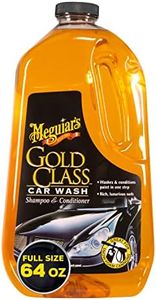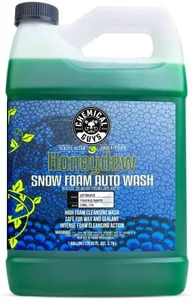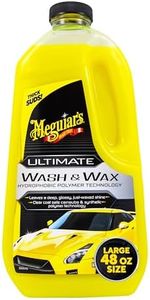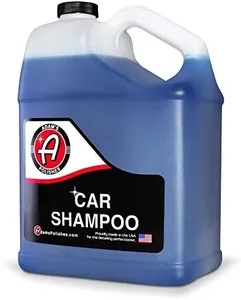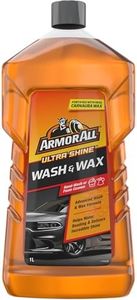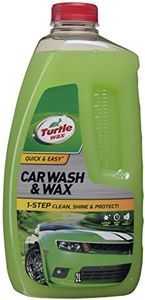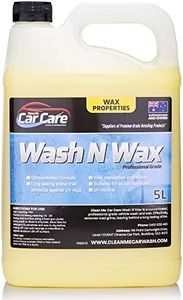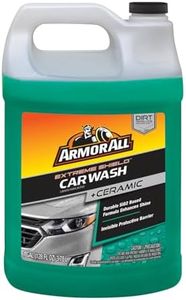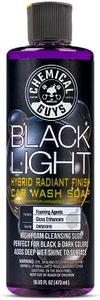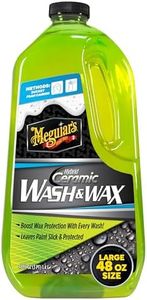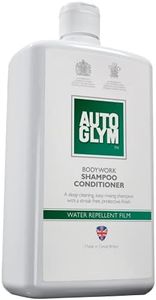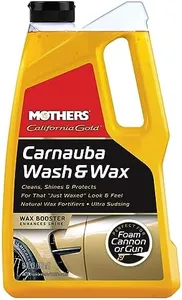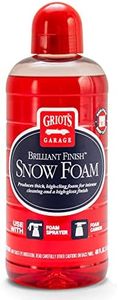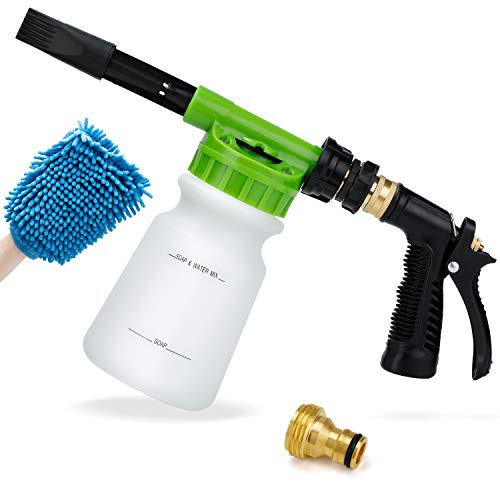We Use CookiesWe use cookies to enhance the security, performance,
functionality and for analytical and promotional activities. By continuing to browse this site you
are agreeing to our privacy policy
10 Best Wash And Wax Car Soap
From leading brands and best sellers available on the web.By clicking on a link to a third party's website, log data is shared with that third party.
Buying Guide for the Best Wash And Wax Car Soap
When choosing a wash-and-wax car soap, it's important to find a product that not only cleans your vehicle effectively but also adds a protective, glossy layer to your paintwork. The idea is to make car maintenance easier by combining washing and waxing into one step. To find the soap that’s best for you, consider how frequently you wash your car, the typical conditions it’s exposed to (such as sun, rain, or dust), and how much shine and protection you want to achieve.Cleaning StrengthCleaning strength refers to how effectively the soap removes dirt, grime, and road debris. This is important because a stronger cleaning agent will save you time and effort, leaving your car spotless. Soaps can be grouped into mild, moderate, and heavy-duty. Mild soaps are gentle and best for light, frequent washes or well-maintained cars. Moderate cleaners are good for regular use by most car owners, balancing cleaning power and paint safety. Heavy-duty cleaners are for cars with stubborn dirt, mud, or bird droppings but may be too harsh for regular use. Choose based on how dirty your car typically gets. For occasional deep cleaning, a stronger solution may be ideal, but for regular use, stick to a balanced or mild option to protect your paint.
Wax ContentWax content is the amount and quality of wax added to the soap. The wax leaves a shiny, protective layer on your car's surface after washing. This is important for adding a bit of gloss and helping repel water and dirt. Soaps with higher wax content offer more shine and short-term protection but may require more thorough rinsing to avoid streaks. Lower wax content will give you a basic clean with just a moderate gloss. If you want a strong, glossy finish and added water beading, look for higher wax levels. If you plan to apply a separate wax layer later, a lower wax content in your soap may be preferable.
pH BalancepH balance refers to how acidic or alkaline the soap is. A pH-balanced soap is important to protect your car’s paint and finish, helping to avoid dullness, etching, or fading. Most car soaps are either pH-neutral (safe for frequent use and all finishes) or mildly alkaline (better cleaning on tough dirt). If your car has specialty coatings or sensitive paint, stick with a pH-neutral soap. For more general use, a soap with a mild pH will still be safe while tackling road grime effectively.
Foaming AbilityFoaming ability is how much lather the soap makes. Foam helps lift dirt from the surface and minimize scratching, making it easier and safer to wash your vehicle. High-foaming soaps are great if you use a foam cannon or want a thick sudsy wash, while medium foam suits most bucket washes and hand applications. Low-foaming soaps still clean but might require more manual scrubbing. If you wash by hand or with a foam gun, go for a higher-foaming product. If you prefer quick rinses, a medium or low-foam option can work well.
Residue and Rinse-abilityResidue and rinse-ability indicate how easily the soap and wax wash off the car and if they leave any unwanted streaks or spots. This matters because difficult-to-rinse soaps can leave films or cause water spots. Fast-rinsing formulas save you time and reduce streaks, ideal if you often wash your car outside in the sun. Look for products labeled 'no streaks,' 'spot-free,' or 'quick rinse' if you're in a hard-water area or prefer a speedy wash routine.
Surface CompatibilitySurface compatibility is about whether the soap is safe for all finishes—regular paint, clear coat, vinyl wraps, or matte surfaces. Correct compatibility is important to prevent dulling or damaging specialty surface finishes. If your car has a special finish (like matte or ceramic coating), make sure the soap is compatible. For standard paint, most car wash soaps are safe, but if your vehicle has wraps or other coatings, double-check for suitability to maintain the surface’s look and protection.
